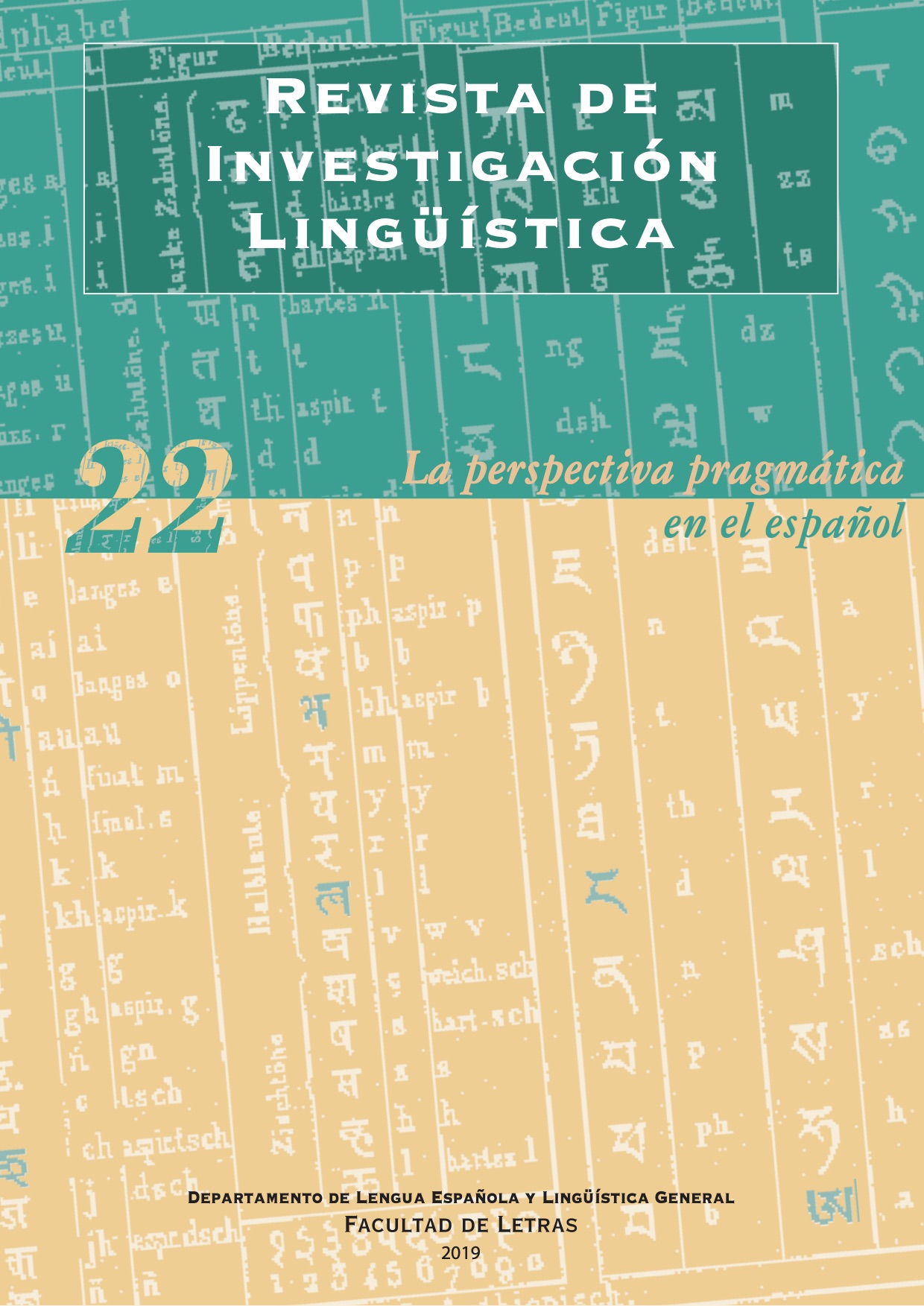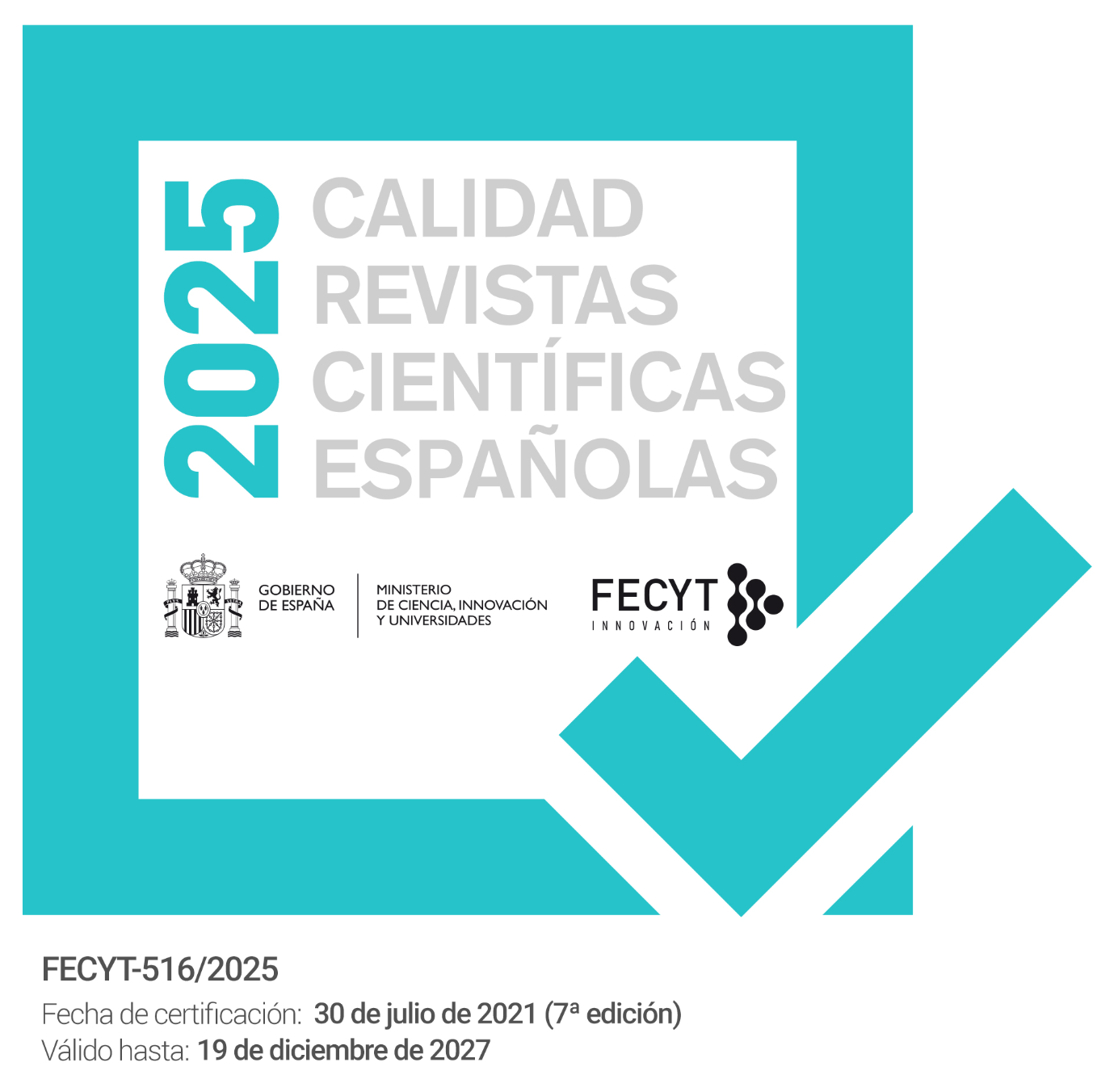The verbs «llamarse» and «apellidarse»: a historical and cognitive characterization
Abstract
This article has as its purpose to offer a syntactic and semantic profile of the verbs llamarse and apellidarse carried out from the postulates of cognitive-functional linguistics. It i sour intention to: (a) show how these verbs work in Spanish; (b) identify their conceptual peculiarities (which are quite remarkable within the context of European languages); and (c) explain the possible -historical and linguistic- reasons why these pronominal verbs, and not others, are used to express the Christian name and the surname in Spanish. This work provides original and the illocutionary force of language.
Downloads
-
Abstract789
-
PDF (Español (España))1711
References
Bernárdez, Enrique (2016): Viaje lingüístico por el mundo. Iniciación a la tipología de las lenguas, Madrid, Alianza.
Choza, Jacinto (2017): La moral originaria: la religión neolítica, Sevilla, Thémata.
Cifuentes Honrubia, José Luis (2012): «Atribución y sus límites: atributo, predicativo y complemento de modo», Estudios de Lingüística Universidad de Alicante, 26, pp. 89-144.
Company Company, Concepción y Javier Cuétara Priede (2008): Manual de gramática histórica, México, UNAM.
Corominas, Joan y José Antonio Pascual (1980-1991): Diccionario crítico etimológico castellano e hispánico, Madrid, Gredos.
Culleton, Alfredo (2010): «Tres aportes al concepto de persona: Boecio (substancia), Ricardo de San Víctor (existencia) y Escoto (incomunicabilidad)», Revista Española de Filosofía Medieval, 17, pp. 59-71.
Damasio, Antonio (2018): La sensación de lo que ocurre. Cuerpo y emoción en la construcción de la conciencia, Barcelona, Ediciones Destino.
Delbecque, Nicole (2000): «Las cópulas ser y estar: categorización frente a deíxis», Revista española de lingüística aplicada, Vol. Extra 1, pp. 239-280.
Demonte, Violeta y Pascual José Masullo (1999): «La predicación: Los complementos predicativos», en Ignacio Bosque y Violeta Demonte (dirs.), Gramática Descriptiva de la Lengua Española, Madrid, Espasa Calpe, pp. 2461- 2523.
Dorren, Gaston (2019): Babel. La vuelta al mundo en 20 idiomas, Madrid, Turner. Eco, Umberto (1999): La búsqueda de la lengua perfecta en la cultura europea, Barcelona, Crítica.
Escandell Vidal, M. Victoria (1996): Introducción a la pragmática, Barcelona, Ariel.
Fernández Jaén, Jorge (2015): «The pseudo-copulative verbs verse and sentirse: Diachronic and conceptual aspects», en Elisa Barrajón López, José Luis Cifuentes Honrubia y Susana Rodríguez Rosique (eds.), Verb classes and aspect, Amsterdam, John Benjamins, pp. 218-237.
Fernández Leborans, María Jesús (1999): «El nombre propio», en Ignacio Bosque y Violeta Demonte (dirs.), Gramática Descriptiva de la Lengua Española, Madrid, Espasa Calpe, pp. 77-128.
Geeraerts, Dirk (1997): Diachronic Prototype Semantics. A Contribution to Historical Lexicology, Oxford, Oxford University Press.
Gómez Torrego, Leonardo (2007[1997]): Gramática didáctica del español, Madrid, Ediciones SM.
Gray, Louis H. (1939): Foundations of Language, New York, Macmillan. Gumiel Molina, Silvia (2005), Los complementos predicativos, Madrid, Arco / Libros.
Heine, Bernd (2002): «On the Role of Context in Grammaticalization», en Ilse Wischer y Gabriele Diewald (eds.), New Reflections on Grammaticalization, Amsterdam, John Benjamins, pp. 83-101.
Hopper, Paul J. (1991): «On some principles of grammaticalization», en Elizabeth C. Traugott y Bernd Heine (eds.), Approaches to grammaticalization, Amsterdam / Philadelphia, John Benjamins, pp. 117-134.
Inchaurralde, Carlos e Ignacio Vázquez (eds.) (2000): Una introducción cognitiva al lenguaje y a la lingüística, Zaragoza, Mira Editores.
Kleiber, Georges (1981): Problèmes de référence: descriptions définies et noms propres, París, Klincksieck.
Lakoff, George y Mark Johnson (1986[1980]): Metáforas de la vida cotidiana, Madrid, Cátedra.
Langacker, Ronald W. (1987): Foundations of Cognitive Grammar. Vol. 1: Theoretical prerequisites, Stanford, Stanford University Press.
Langacker, Ronald W. (1991a): Foundations of Cognitive Grammar. Vol. 2: Descriptive applications, Stanford, Stanford University Press.
Langacker, Ronald W. (1991b): Concept, Image, and Symbol. The Cognitive Basis of Grammar, Berlin / New York, Mouton de Gruyter.
Langacker, Ronald W. (1999): Grammar and Conceptualization, Berlin / New York, Mouton de Gruyter.
Livi, Antonio (1984): E. Gilson: el espíritu de la filosofía medieval, Madrid, Editorial Magisterio Español, S. A.
Mora, Francisco (2008): El reloj de la sabiduría. Tiempos y espacios en el cerebro humano, Madrid, Alianza Editorial.
Morera, Marcial (2017): Cortesía, apodos e hipocorísticos en español: fundamentos lingüísticos, Madrid, Arco/Libros.
Morimoto, Yuko y María Victoria Pavón Lucero (2007): Los verbos pseudo-copulativos del español, Madrid, Arco/Libros.
Moro, Andrea (2017): A Brief History of the Verb To Be, Cambridge, The MIT Press.
Porroche Ballesteros, Margarita (1988): Ser, estar y verbos de cambio, Madrid, Arco/Libros.
Real Academia Española (2009): Nueva gramática de la lengua española, Madrid, Espasa Calpe.
Sádaba, Javier (2006): De Dios a la nada. Las creencias religiosas, Madrid, Espasa Calpe.
Turner, Mark (2014): The Origin of Ideas. Blending, Creativity, and the Human Spark, Oxford, Oxford University Press.
Ullmann, Stephen (1968): Lenguaje y estilo, Madrid, Aguilar.
Van Gorp, Lise (2014): El porqué de la decena de verbos pseudo-copulativos de cambio en español, Universidad de Lovaina, Tesis Doctoral.
Vendler, Zeno (1967): Linguistics in Philosophy, New York, Cornell University Press.
Vera Luján, Agustín (2003): «Sobre el origen de las construcciones estativo-atributivas con hallar», en José Luis Girón Alconchel et al. (coords.), Estudios ofrecidos al Prof. José Jesús de Bustos Tovar, Madrid, Universidad Complutense de Madrid, pp. 259-273.
Villaverde Maza, Noemí (2017): Una antropóloga en la Luna. Las historias más sorprendentes de la especie humana, Madrid, Oberon.
Corpus
CORDE = Real Academia Española: Banco de datos (CORDE) [en línea].
Corpus diacrónico del español. <http://www.rae.es> [16/09/2019].
CREA = Real Academia Española: Banco de datos (CREA) [en línea]. Corpus de referencia del español actual. <http://www.rae.es> [20/09/2019].
The works published in this magazine are subject to the following terms:
1. The Publications Service of the University of Murcia (the publisher) preserves the economic rights (copyright) of the published works, and favors and allows the reuse of same under the license of use indicated in point 2.
2. The papers are published in the electronic edition of the magazine under a Creative Commons Attribution-NonCommercial-NoDerivative 3.0 Spain license (legal text). Papers may be copied, used, disseminated, transmitted and publicly exhibited if the following requirements are met: i) The authorship and the original source of its publication (magazine, editorial and URL of the work) must be cited; ii) The works cannot be used for commercial purposes; iii) The existence and specifications of this user license must be explicitly mentioned.
3. Self-archiving conditions. Authors can electronically disseminate pre-print versions (version before being evaluated) and / or post-print versions (version evaluated and accepted for publication). This makes possible its circulation and diffusion earlier and with it a possible increase in its citation and reach among the academic community. RoMEO color: green.










